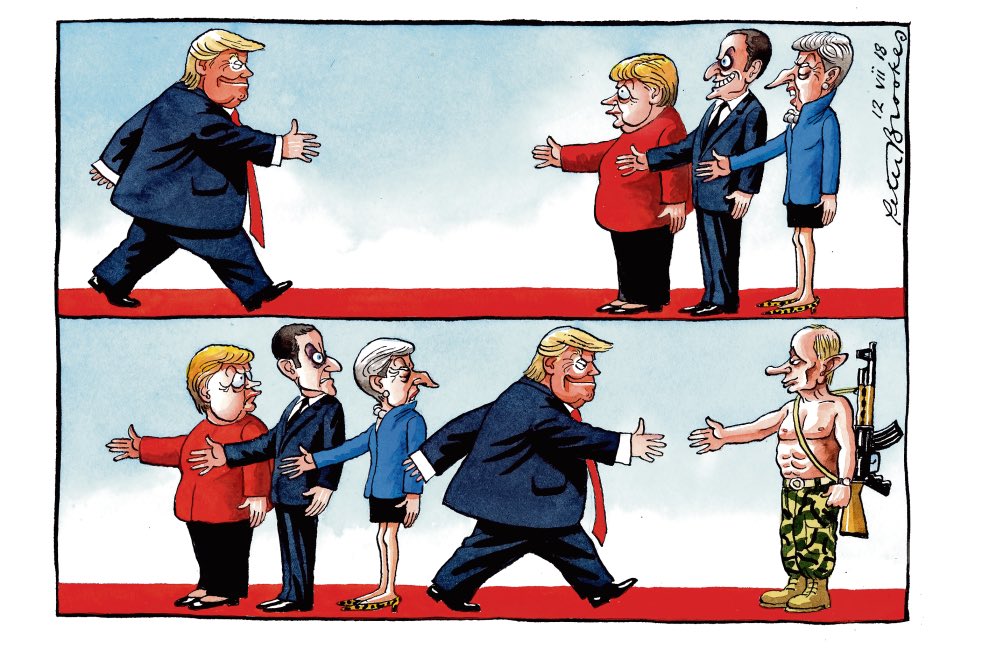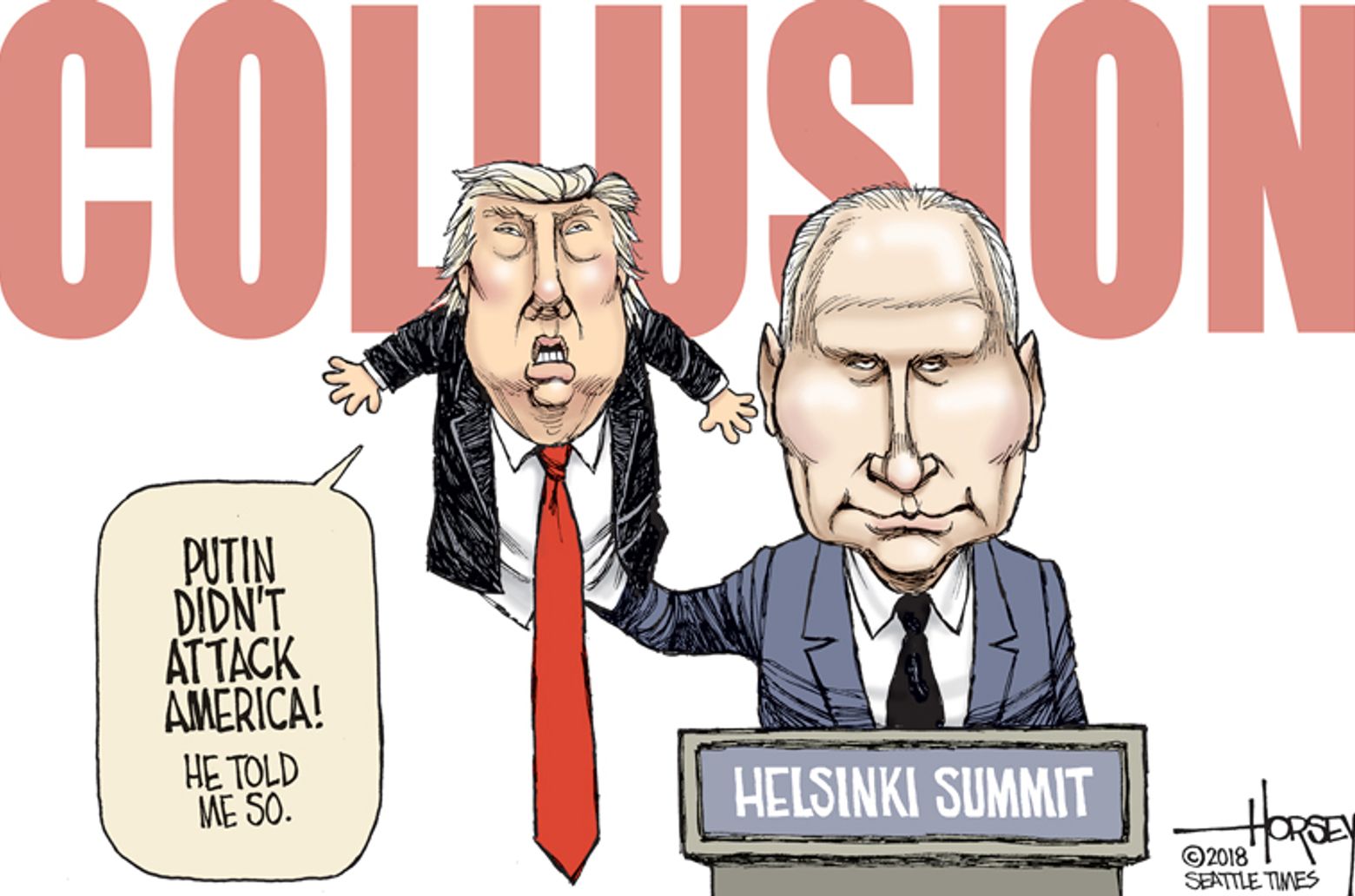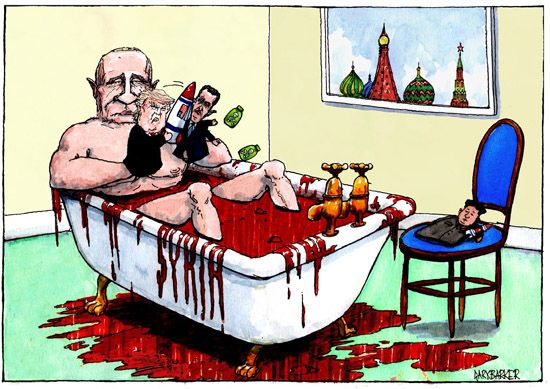Traitor Trump☭Russian Says Trump's Actions are "In Our Interests”☭Americans say, "No Duh!"
Trump Undermines Merkel as She Stands Up to Putin
(Bloomberg) -- The reverberations from Donald Trump’s latest broadside against Germany have reached all the way to Moscow.
The president’s decision to withdraw more than a quarter of the U.S. troops stationed in her country leaves Chancellor Angela Merkel exposed at a moment when she’s facing growing pressure to get tough with Vladimir Putin and was welcomed in the Russian capital.
© Photographer: Adam Berry/Getty Images Europe BERLIN, GERMANY - JANUARY 19: German Chancellor Angela Merkel (CDU, L) greets Russian President Vladimir Putin as he arrives for an international summit on securing peace in Libya at the German federal Chancellery on January 19, 2020, in Berlin, Germany. Leaders of nations and organizations linked to the current conflict are meeting to discuss measures towards reaching a consensus between the warring sides and ending hostilities. (Photo by Adam Berry/Getty Images)“It’s spitting in Merkel’s face,” said Vladimir Frolov, a former Russian diplomat who’s now a foreign-policy analyst. “But it’s in our interests.”
After days of uncertainty, Merkel’s office said Wednesday it was informed that a withdrawal was being considered. A White House press officer has repeatedly declined to confirm the deliberations. But media reports have set alarm bells ringing all the same in Berlin, where it’s been taken as another sign of the cooling transatlantic relationship and the shifting priorities in Washington.
Whether or not the U.S. president intended to undermine Merkel’s efforts to stand up to Russia, this is the latest example of his ability to unsettle European leaders with unpredictable policymaking.
Earlier this year, as the Covid-19 pandemic took hold of Italy, Trump banned flights from the European Union without warning its leaders. In the past, he’s signaled his doubts about NATO’s mutual defense clause, which underpins the continent’s security.
Two people familiar with the matter said former U.S. Ambassador Richard Grenell had talked for some time about his desire to get the U.S. to reduce its troop presence in Germany, possibly by shifting some forces to Poland or by slashing troop levels outright. But the first many senior leaders at the State Department learned that the plan had been formalized was from the news stories announcing the cut.
Peter Beyer, a senior lawmaker with Merkel’s Christian Democratic Union and Germany’s transatlantic coordinator, said Monday that he was still unsure whether the reports were a “trial balloon” or a Trump campaign ploy. If the president does follow through, it would mean “weakening the transatlantic alliance,” he said in an interview.
“This would not be in the interest of NATO and its members, including the U.S. -- but in the interests of China and Russia,” he said.
The departure of 9,500 U.S. servicemen would compound a toxic geopolitical environment for Merkel, with Trump looking to orchestrate a face-to-face meeting with the Russian president at a Group of Seven summit during the fall and pressuring Germany to take a tougher stance with China, its biggest trading partner. Russia was ejected from the G-7 in 2014 after it seized the Crimean Peninsula from Ukraine.
Putin for his part views the chancellor as a lame duck because she has declared she won’t run for re-election when her fourth term ends next year, Frolov said.
History of Engagement
Merkel, an arch-pragmatist, has a history of trying to engage with Putin and went out on a limb to sustain ties with the Kremlin since Russia was sanctioned by the EU over Crimea, pushing ahead with the Nord Stream 2 gas pipeline across the Baltic in the face of increasing hostility from Washington. There are now doubts as to whether the $15 billion link will ever be completed with the U.S. threatening sanctions on companies that get involved. German officials say they are frustrated they’ve got so little back for their investment in Putin.
Now the chancellor is coming under pressure domestically because of new revelations about the role of Russian military intelligence in a cyberattack on the Bundestag in 2015 and a gangland-style execution in Berlin last summer as well as fresh tensions in negotiations on Ukraine, according to German officials.
Merkel underscored the new chill in a foreign policy speech last month.
Russia “supports puppet regimes in parts of eastern Ukraine and attacks western democracies, including Germany, with hybrid resources,” she said.
The U.S. meanwhile is sending senior officials to Vienna on June 22 for arms-control talks with their Russian counterparts. The Trump administration wants Moscow’s help bringing China into broader negotiations to limit all three countries’ nuclear weapons stockpiles.
Merkel’s relationship with Putin, who served as a KGB officer in East Germany before the Berlin Wall collapsed, reached a low point at the end of May.
The German Foreign Ministry summoned the Russian ambassador after federal prosecutors concluded that a Russian military intelligence operative was involved in the 2015 attack on computer networks in the Bundestag.
Merkel said Russia’s involvement was “outrageous” and the Foreign Ministry said Germany will deploy a new EU cybersecurity tool to impose targeted sanctions against suspects.
But the ministry had more to discuss with Ambassador Sergei Nechayev.
‘A very tough and bloody man’
The Aug. 23 murder of a Georgian man in broad daylight in Kleiner Tiergarten park, a short walk from Merkel’s office, triggered tit-for-tat expulsions of diplomats from Berlin and Moscow at the time and Germany’s Federal Prosecutor, which took over the investigation in December, says there is evidence of Russian state involvement in that attack too.
While officials await the results of the investigation, the ministry says it’s “expressly prepared for further measures” against Moscow.
To cap off the problems, talks aimed at scaling back the fighting in eastern Ukraine are going nowhere with German officials complaining that Russia insists on presenting itself as a mediator in the conflict rather than a participant, according to two people familiar with the talks. The stance undermines the five-year-old Minsk process that set out a framework for negotiations, they said.
Merkel already confronted Putin over the Tiergarten killing at a summit in Paris in December, demanding the Kremlin hand over any information that could help the investigation. But she got little joy.
Putin said that the victim, who had several aliases and is thought to have fought against the Russian army in Chechnya, was “a militant, and a very tough and bloody man.” Russian assistance hasn’t been forthcoming, German officials say.
The Social Democrats, Merkel’s junior coalition partner, has traditionally had a more conciliatory approach to Russia than her Christian Democrats. But even they now are demanding the chancellor stands up to Putin.
“We can’t allow such things to happen on German soil,” Nils Schmid, a senior SPD lawmaker on the Bundestag foreign affairs committee, said in an interview. “We’re not going to accept that.”
Patrick Donahue, Bloomberg, 1 hour ago











Comments
Post a Comment